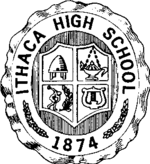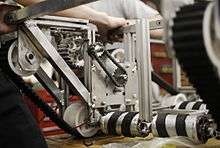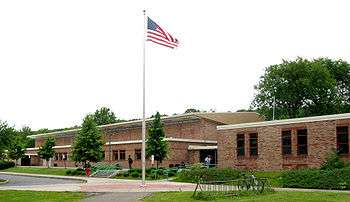Ithaca High School (Ithaca, New York)
| Ithaca High School | |
|---|---|
 | |
| Location | |
|
New York United States | |
| Coordinates | 42°27′19″N 76°29′53″W / 42.4553°N 76.4980°WCoordinates: 42°27′19″N 76°29′53″W / 42.4553°N 76.4980°W |
| Information | |
| Type | Public |
| Established | 1875 |
| School district | Ithaca City School District |
| Staff | 160 |
| Faculty | 130 |
| Color(s) | Cardinal and Gold |
| Mascot | Red |
| Website | http://www.ithacacityschools.org/index.cfm/page/highschool.htm |
- For other schools by this name, see Ithaca High School (disambiguation)
Ithaca High School (IHS) is a public high school in Ithaca, New York. It is part of the Ithaca City School District, and has an enrollment of approximately 1,675.
About
Ithaca High School has historically had a reputation for strong academics. While today the school faces various problems, many common to most high schools, by most objective measures Ithaca High School students still score well above state and national averages. The mean SAT score in 2003 was 1169, compared to 1026 nationally. Typically, about 70% of students matriculate at four-year colleges and 20% at two-year colleges following graduation. The school traditionally sends a very large number of graduates to nearby Cornell University; from 2000 to 2004, an average of 37.6 students per class (slightly less than ten percent) matriculated at Cornell immediately following graduation.[1]
Nineteen advanced placement courses are offered:[2]
- Biology
- Chemistry
- Environmental Science
- Physics (B & C)
- Calculus (AB & BC)
- Statistics
- Computer Science AB (to be downgraded to A when College Board cuts AB)
- English Language
- English Literature
- Spanish Language
- French Language
- German Language
- Latin: Vergil
- Human Geography
- Psychology
- U.S. History
- World History
- Studio Art
- Art History
- Music Theory
There are 140 professional staff members, including about 120 classroom teachers, and over 85% of the faculty has a master's degree or higher. Two Ithaca High School math teachers received the prestigious Edyth May Sliffe Award, given annually to about 25 math teachers nationally: Dave Bock (twice, in 1990[3] and 1993[4]), and Roselyn Teukolsky (in 1991).[5]
Ithaca High School is located at 1401 North Cayuga Street in the north end of Ithaca, near Stewart Park, Cayuga Lake, and Ithaca Falls.[6] Designed by the architecture firm Perkins and Will,[7] it is a California-style campus, with 11 mostly interconnected buildings spread across a fairly wide area. Some have praised the campus as being architecturally innovative, while others have criticized it as inefficient and inappropriate to Ithaca's climate (notably as students routinely travel outdoors between classes, out of necessity or for a more direct route). The campus includes the Frank R. Bliss Gymnasium, the 840-seat Claude L. Kulp Auditorium, and York Lecture Hall. Most of the Ithaca City School District's administrative offices and the Board of Education building are located on the same campus, as are the offices of the ICSD employee unions. Currently, additions are in progress that will double the size of Kulp Auditorium, adding separate rehearsal, practice, and office spaces for the orchestra, choir, and band, as well as create a large fitness center and competition gymnasium . The building is one of the few schools that use deep lake water cooling (from Cayuga Lake) for air conditioning.
Athletics
The school is also part of the Southern Tier Athletic Conference (STAC). Athletic teams compete as the "Little Red," in counterpoint to the "Big Red" of nearby Cornell University. Ithaca High School has won five New York State Class A Boys’ ice hockey championships (1984, 1987, 1994, 2000, 2007), as well as four Upstate New York Girls' Hockey League championships (2001, 2002, 2003, 2011). The Ithaca Women's Varsity Swim team has had more than two decades of consecutive Section IV titles, several unofficial state titles, and countless undefeated seasons. Since 1989, the team has lost only one dual meet in 1998. The team has been coached by Roy Staley for through all of these successful seasons. The Boys' Lacrosse Program has established itself as a Section IV, Class A powerhouse, winning five straight sectional championships from 2000 to 2005 and often finding itself in the State and National Rankings. Furthermore, Little Reds lacrosse team has been a recent hot streak, making the Section IV, Class A finals in both 2010 and 2011, but losing to Fairport and Farmingdale programs respectively.[8] Tough loses, but helped solidify its reputation as a local lacrosse hub in upstate New York and a dominant program for years to come. And the Boys and girls' Track and Field Program went undefeated in dual meets for eight years until 2005, when defeated by 70-71 by Vestal High School. The program turns out state competitors regularly in both Cross Country and Track and Field. In 2005, it produced two state and Federation Champions, Drew Hilker (pentathalon) and Peter Thompson (pole vault). In addition to offering most traditional school sports Ithaca offers a large array of private sports teams which are mostly made up of Ithaca High School Students. Notable among these teams is Cascadilla Boat Club which has gone undefeated in section III championships for its entire existence.
Socio-Economic Tensions
Local demographics have resulted in continuing socio-economic tensions:
The [Ithaca] schools have children of professors at Cornell University and Ithaca College, who would not be rattled by a dinner-table chat about quantum physics. They also have students from Ithaca's poorer streets and from the hardscrabble farms and mobile homes in the villages that surround this Finger Lakes city."We have kids who live on dirt floors and go outside to the restroom and come to school to take a shower, and we have Carl Sagan's kids," said Peter Romani, a history teacher at Ithaca High School.[9]
Most recently, the school experienced difficulties in 2004[10] and 2007. In December 2007, over 200 Ithaca residents signed a petition calling for principal Joseph M. Wilson to be fired[11] after what they believed was Wilson's mishandling of a series of racially charged incidents.[12]
FIRST Robotics

The Ithaca High School FIRST Robotics Team, Code Red Robotics (Team 639), notably sponsored by Borg Warner Morse TEC and Cornell University, has won first place in several regional competitions including the 2004 Canadian Regional, the 2013 and 2014 Cleveland Regionals, and the 2016 Finger Lakes Regional, as well as winning the GM Industrial Design Award (2002, 2004, 2005, 2012) multiple times. In their 2012 season, they won the Regional Engineering Inspiration award, the second most prestigious award given in the FIRST organization at a regional level. This award qualified the team for the World Championships where the team advanced to finals of their division with alliance partners Team 68 and Team 330.[13]
History

Ithaca High School was founded in 1875 as the successor to the Ithaca Academy, a private school that had operated since the 1820s. In the late 19th and early 20th century, the school had a significant side business as a tuition-charging college preparatory school; then-Cornell University President Jacob Gould Schurman called it "one of the finest in the Northeast."[14] A new building for the high school on the site of the former academy was built in 1885; that building burned on February 14, 1912. Renowned architect William Henry Miller, who designed many buildings at Cornell, designed the new building, which the high school occupied from 1915 to 1960. That building was later used as DeWitt Junior High school for a number of years and then saved from demolition by local architect William Downing. Downing converted the building into an eclectic collection of shops, offices, studios, apartments, and restaurants known as the Dewitt Mall. The nationally renowned Moosewood Restaurant is also in the mall.
The Ithaca High School newspaper, the Tattler, founded in 1892, is one of the oldest high school student newspapers in the country. At times in its history (in the 1960s and 1970s, as well as more recently beginning in 2005) it has been involved in controversy over claims of unconstitutional school censorship.[15] Paul Wolfowitz and Stephen L. Carter were both editors for the paper during their time at Ithaca High School.
From 1955 to 1967, the Ithaca High School Band received national recognition for its musicianship and innovation under the direction of Frank Battisti. During this time, the band commissioned 24 new compositions (many by Pulitzer Prize winners and some now important wind ensemble pieces), performed at locations such as the Eastman School of Music, the New York World’s Fair, and Rockefeller Center, and played with many guest soloists and conductors including Benny Goodman and Doc Severinsen. A book, One Band that Took a Chance by Brian Norcross, was later published about the IHS band of this era.[16] On May 7, 2009, Ithaca High School held a 50th Anniversary concert in honor of Frank Battisti and the 1959 commission of Warren Benson's piece Night Song, which included a new commission by local composer Gregory B. Rudgers, Night Fantasy.
The Ithaca High School Orchestra, meanwhile, is one of the oldest high school orchestras in the country, having been established in 1904. It celebrated its 100th anniversary with a celebration and concert that included a newly commissioned work entitled Enlightened City by composer Robert Paterson.[17]
Notable alumni
The following is an incomplete list of notable Ithaca High School alumni:
- Dustin Brown, hockey player, rightwinger, Stanley Cup Champion, and captain for Los Angeles Kings
- Andrew Byrnes '01, rower in 2008 and 2012 Summer Olympics
- Stephen L. Carter '72, author and Yale Law School professor[18]
- Caryn Davies '00, Olympic rower
- Arthur Dean 1916, chief international negotiator for President Dwight Eisenhower[19]
- Noah Feldshuh '06, musician, X Ambassadors
- Daniel Mark Fogel '65, President of the University of Vermont, 2002-2011
- Sharon Hammes-Schiffer, Professor, University of Illinois at Urbana-Champaign and Member of National Academy of Sciences
- Roger Howe '61, mathematician and Yale professor
- Mia Korf '83, actress (The Days and Nights of Molly Dodd, One Life to Live)
- Steven Levitsky, Harvard University Government Professor
- Disashi Lumumba-Kasongo '00, musician, Gym Class Heroes
- Daniel R. Mackesey, National Lacrosse Hall of Fame member
- Tamdan McCrory '04, wrestler;[20] professional Mixed Martial Artist for the UFC[21]
- Mary McDonnell, actress (Battlestar Galactica, Dances with Wolves)
- Alex Meyer '06, Olympic swimmer[22]
- John Roemer '62, economist and Yale professor
- Hugh Troy, noted practical joker
- Maïa Vidal '06, musician
- Paul Wolfowitz '61, Deputy Secretary of Defense (2001–2005), World Bank President (2005–2007)
Principals
IHS has in recent years had very high administrator turnover. Since 1988, fourteen principals have passed through IHS, and only one has stayed for longer than three years.[23]
In February 2008, principal Joseph M. Wilson was granted tenure in return for agreeing to resign at the end of the 2008–2009 school year.[24] Wilson had been the subject of considerable controversy in his time at IHS. In 2005 he was sued in federal court for the alleged censorship of the school newspaper, The Tattler; the case remains in litigation. In December 2007, over 200 Ithaca residents signed a petition calling for him to be fired[11] after what they believed was Wilson's mishandling of a series of racially charged incidents in the school.[12] In a 2014 article in the Tompkins Weekly about the high principal turnover, Wilson said:
"A principal can be successful if there is a common set of assumptions about how students are going to progress through the school and how they are going to behave in the school." During his stint, he says, there was "no commonality among board members about how things should transpire, how things should be done and what should occur if things don’t play out as planned. Every situation and every student was some kind of exception. That simply doesn’t work," he explains. ... "Each of the nine board members gave us his or her opinion, direction, criticism. Nothing they said was consistent," Wilson says. ... "This is an academic community more than anything else. College and graduate-level academics are used to developing their own ideas and holding fast to them. Most people in an academic community are not compelled to collaborate. They adhere to their own views and advocate for them without coming to a consensus. In the absence of consensus or compromise, that approach carries over into the decision-making process in the public arena," Wilson says.[25]
In August 2014, Jarrett Powers announced he was leaving to become Superintendent of the Union Springs Central School District.[26]
- D.O Barto, 1890–1892
- Frank David Boynton, 1893–1912
- Frank R. Bliss, c. 1930-1962
- Dr. John Graves, 1963–1973
- John Caren, 1979–1988
- Leslie Graves (interim), 1988-1989
- Randy Ehrenberg (interim), 1989-1991
- George Kiley, 1991–1993
- Dr. Mark Piechota (interim), 1993-1994
- Dr. Kathryn Hellweg, 1994–1996
- Dr. Kevin Mack, (interim), 1996–1997
- Susan B. Strauss, 1997–2000
- Ismael Villafañe, 2000–2003
- Charles LaBarbera (interim), 2003–2004
- Joseph M. Wilson, J.D., 2004–2009
- Donald Mills, 2009–2011
- Jarett Powers, 2011–2014
- Jason Trumble, 2014–Present
See also
References and further reading
- ↑ IHS Admission Decisions by Decile, 2000-2004, Ithaca High School Guidance Office. A total of 188 students from the classes of 2000 through 2004 were offered immediate acceptance at Cornell.
- ↑ http://www.icsd.k12.ny.us/legacy/highschool/studserv/08-09%20Program%20Studies.doc
- ↑ 1990 Edyth May Sliffe Awards for High School
- ↑ 1993 Edyth May Sliffe Awards for High School
- ↑ 1991 Edyth May Sliffe Awards for High School
- ↑ Johnson, Kirk (2000-10-15). "Ithaca Journal; Sweet Fishing and a Gorgeous Gorge, if You Don't Mind All That Old Lead". New York Times.
- ↑ . The Tattler. 1960-10-07. Missing or empty
|title=(help) - ↑ http://www.laxpower.com/update11/binboy/XITHNY.PHP
- ↑ Berger, Joseph (1995-06-04). "Two Classes Of Students: Ithaca High Joins Debate". New York Times.
- ↑ Graham, Karl (2004-04-28). "Letter: Tension Tied to Race Percolates in Ithaca". Ithaca Times.
- 1 2 Sanders, Topher (2007-12-12). "Petition calls for Principal Joe Wilson's ouster". Ithaca Journal.
- 1 2 Staba, David (2007-10-23). "Tension Tied to Race Percolates in Ithaca". New York Times.
- ↑ team639.org
- ↑ Alexander, Andrew (2006-09-09). "Ithaca's Boynton Was a Model Educator". Ithaca Journal. pp. 3B.
- ↑ http://www.rmozone.com/tattlerwiki
- ↑ Norcross, Brian H. (1994). One band that took a chance: the Ithaca High School Band from 1955 to 1967. Ft. Lauderdale, Fl: Meredith Music Publications.
- ↑ http://www.robpaterson.com/works-notes/enlightened_city.html
- ↑ Carter, Stephen (1992). "The Best Black". Reflections of an Affirmative Action Baby. Basic Books. ISBN 978-0-465-06869-2.
- ↑ Krebs, Albin (1987-12-01). "Arthur H. Dean, Envoy to Korea Talks, Dies at 89". New York Times.
- ↑ "Tamdan Mccroy alum wrestler".
- ↑ "McCrory UFC Profile".
- ↑ Crouse, Karen (2011-10-21). "From Walden Pond to the Olympics, Swimmer Thrives in Open Water". New York Times.
- ↑ Claiborne, Margaret (2000-02-10). "Ithaca High loses another principal". Ithaca Journal. pp. 1A.
- ↑ Sanders, Topher (2008-02-28). "Outgoing IHS principal still focused on goals; Wilson to be given tenure this year in exchange for resignation in June '09". Ithaca Journal.
- ↑ Sonken, Lori (2014-09-15). "IHS Struggles to Keep Principals" (PDF). Tompkins Weekly.
- ↑ Stein, Jeff (2014-08-11). "Ithaca High School principal appointed superintendent of Cayuga County school district". Ithaca Voice.
- Terzian, Sevan G. (2000). "The Emergence of a Comprehensive High School: Ithaca High School in Ithaca, New York, 1875-1941". Doctoral thesis, Indiana University.
- Terzian, Sevan G. (2004). "The Elusive Goal of School Spirit in the Comprehensive High School: A Case History, 1916-1941". The High School Journal. University of North Carolina Press. 88 (1): 42–51. JSTOR 40364276.
- Terzian, Sevan G. "The Founding of IHS." Serialized in The Tattler, 2004–2005
- Terzian, Sevan G., & Beadie, N. "'Let the People Remember It': Academies and the Rise of Public High Schools, 1865-1890." In N. Beadie & K. Tolley (Eds.), Chartered Schools: Two Hundred Years of Independent Academies in the United States, 1727-1925, pp. 251–283. New York: RoutledgeFalmer, 2002.
External links
- Official Ithaca High School website
- Alumni & Friends of Ithaca High School
- The Tattler, online site for the school newspaper
- Ithaca High School Boys' Varsity Hockey